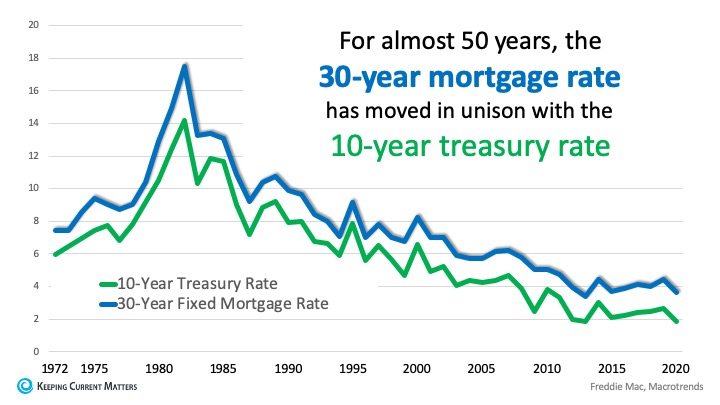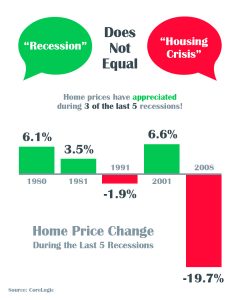How Will Coronavirus Impact the Housing Market?
How Will Coronavirus Impact the Housing Market?
The Coronavirus (COVID-19) has caused massive global uncertainty, including a stock market correction no one could have seen coming. While much of the news has been about the effect on various markets, let’s also acknowledge the true impact it continues to have on lives and families around the world.
With all this uncertainty, how do you make powerful and confident decisions in regard to your real estate plans?
The National Association of Realtors (NAR) anticipates:
“At the very least, the coronavirus could cause some people to put home sales on hold.”
While this is an understandable approach, it is important to balance that with how it may end up costing you in the long run. If you’re considering buying or selling a home, it is key to educate yourself so that you can take thoughtful and intentional next steps for your future.
For example, when there’s fear in the world, we see lower mortgage interest rates as investors flee stocks for the safety of bonds. This connection should be considered when making real estate decisions.
According to the National Association of Home Builders (NAHB):
“The Fed’s action was expected but perhaps not to this degree and timing. And the policy change was consistent with recent declines for interest rates in the bond market. These declines should push mortgage interest rates closer to a low 3% average for the 30-year fixed rate mortgage.”
This is exactly what we’re experiencing right now as mortgage interest rates hover at the lowest levels in the history of the housing market.
Bottom Line
The full impact of the Coronavirus is still not yet known. It is in times like these that working with an informed and educated real estate professional can make all the difference in the world.
How the Housing Market Benefits with Uncertainty in the World
It’s hard to listen to today’s news without hearing about the uncertainty surrounding global markets, the spread of the coronavirus, and tensions in the Middle East, just to name a few. These concerns have caused some to question their investment plans going forward. As an example, in Vanguard’s Global Outlook for 2020, the fund explains,
“Slowing global growth and elevated uncertainty create a fragile backdrop for markets in 2020 and beyond.”
Is there a silver lining to this cloud of doubt?
Some worry this could cause concern for the housing market. The uncertainty, however, may actually mean good news for real estate.
Mark Fleming, Chief Economist at First American, discussed the situation in a recent report,
“Global events and uncertainty…impact the economy, and more specifically, the housing market… bonds, backed by the full faith and credit of the government, are widely considered the safest investments in the world. When global investors sense increased uncertainty, there is a ‘flight to safety’ in bonds, which causes their price to go up, and their yield to go down.”
Last week, in a HousingWire article, Kathleen Howley reaffirmed Fleming’s point,
“The death toll from the coronavirus already has passed Severe Acute Respiratory Syndrome, or SARS, that bruised the world’s economy in 2003…That’s making investors around the world anxious, and when they get anxious, they tend to sell off stocks and seek the safe haven of bonds. An increase in competition for bonds means investors, including the people who buy mortgage-backed bonds, have to take lower yields. That translates into lower mortgage rates.”
The yield from treasury bonds is the rate investors receive when they purchase the bond. Historically, when the treasury rate moves up or down, the 30-year mortgage rate follows. Here’s a powerful graph showing the relationship between the two over the last 48 years: How might concerns about global challenges impact the housing market in 2020? Fleming explains,
How might concerns about global challenges impact the housing market in 2020? Fleming explains,
“Even a small change in the 10-year Treasury due to increased uncertainty, let’s say a slight drop to 1.6 percent, would imply a 30-year, fixed mortgage rate as low as 3.3 percent. Assuming no change in household income, that would mean a house-buying power gain of $21,000, a five percent increase.”
Bottom Line
For a multitude of reasons, 2020 could be a challenging year. It seems, however, real estate will do just fine. As Fleming concluded in his report:
“Amid uncertainty, the house-buying power of U.S. consumers can benefit significantly.”
How Has the Housing Market Responded to Past Recessions?
There is plenty of talk in the media about a pending recession.
And it makes sense that buyers and sellers remember the horrors of 2008 when they hear the word “recession.”
Ali Wolf, Director of Economic Research at the real estate consulting firm Meyers Research, addressed this point in a recent interview:
“With people having PTSD from the last time, they’re still afraid of buying at the wrong time.”
Most experts, however, believe if there is a recession, it will not resemble 2008. This housing market is in no way the same as it was just over a decade ago.
And the good news is, home values actually increased in 3 of the last 5 U.S. recessions, and decreased by less than 2% in the 4th.

Many experts predict a potential recession is on the horizon…
However, housing will NOT be the trigger and this will NOT be a repeat of the 2008 crash!
In fact, home values will likely still continue to appreciate!
If you have any questions, please reach out to me and we can discuss.
#housing #ushousing #ushousingmarket #ealestate #realestatetips #housingcrisis #notarecession #recession #buysell #forsale #covid19 #realtortips #realestateadvice #realty #instarealtor #realestateagent

